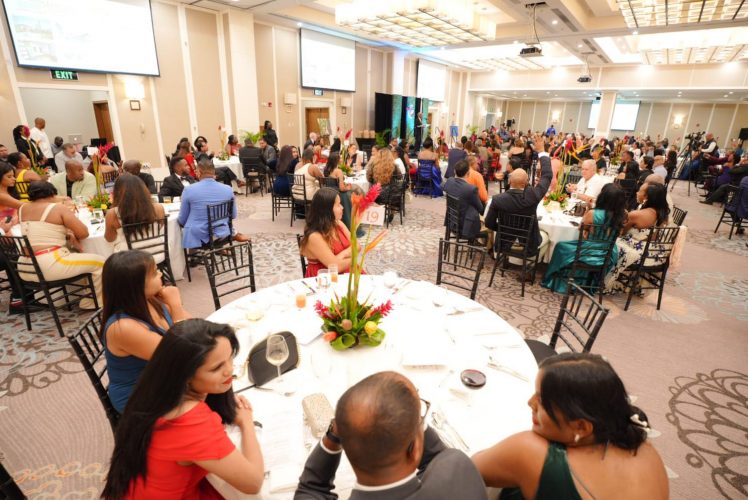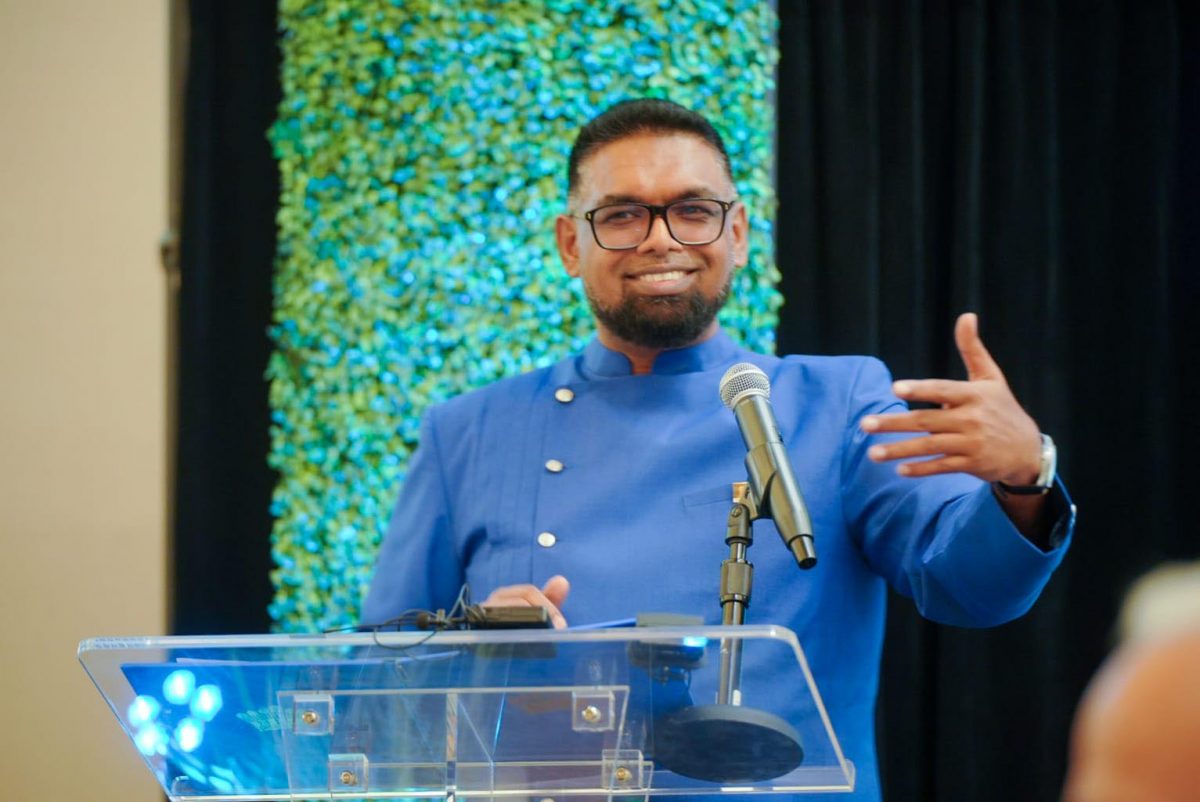Underscoring that as part of a diversified economy the tourism sector will play an integral role, President Irfaan Ali said that the government will provide support to locals who see a future in building this country’s unique product, but urged that those investments should start swiftly.
To tap into the over US$9 trillion global industry, Ali advised, consortiums should be formed and partnerships entered into as more can be done jointly as compared to “working in silos”.
“We see tourism as a central part of the growth story for our country. Tourism is going to be one of the main components of the structure of our economy, now and in the future. Tourism has an important place in the future. I am not saying hotels or rooms, I am saying tourism. We have to now work on building a structure around this model because it has to be an economic model,” the President said in his address to the Tourism and Hospitality Association of Guyana’s (THAG) Annual President’s Award Dinner and Auction, held on Saturday night at the Marriott Hotel.

“For tourism to be successful, it has to fall into an economic model that allows it to grow, allows it to prosper, and allows it to expand itself. For that to happen, we have to have seamless coordination between government policy, tourism developers, and financial institutions,” he added.
The return of the annual dinner since COVID in 2020, saw a room full of representatives from various areas in the hospitality sector, the business community and members of the diplomatic community. Current Canadian High Commissioner to Barbados Lillian Chatterjee who served here from 2017 to 2020 was also present.
The President pointed out COVID has had a devastating impact on the global tourism sector. Pointing to data on the global impact of tourism, he noted that before the pandemic, it was one of the fastest growing sectors in the world. At that time, tourism accounted for some 10.3% of global gross domestic product. Currently, the tourism market is estimated at US$9 trillion which accounts for around 10% of global employment.
He stated that from desk studies here, Guyana saw its citizens more interested in its own product during the pandemic lockdown period and in turn, domestic tourism increased when restrictions were lifted.
Building on that momentum, Ali said, the Guyanese diaspora also found renewed interest in their country and they too are helping to sell the Guyana brand, which the populace can expand and invest in as it continuously grows.
However, that brand, according to the President, has to be built in a structured way and tourism has to become a part of Guyana’s culture. “We have to fix this structure and then work hand in hand to position ourselves in the market,” he said.
The President said this country has myriad areas to sell and niche markets to capitalize on, and as such synergies must be fused and partnerships forged, given that tourism’s impact on the financial sector is more attractive now than it was prior to oil discovery. Guyana’s visibility on the world stage, he said, positions it to take advantage of its tourism product.
“Ten years ago, if an investor went to a bank and said, ‘I want to develop an eco lodge’, trust me, you won’t even get an appointment for a meeting. At least today you can get that meeting. The understanding is changing,” Ali posited.
“For us, for a very long time, tourism was treated and approached in a haphazard way. It was like an accident. You landed on a resort by accident. The model must bring a structure that brings along all the stakeholders, and this is what is key. The policy is important, but the policy is not the model. The model is what you are going to implement, and what the core attributes of what we’re going to sell to the world will be. And the policy is what is going to support that model,” he stressed.
Highlighting areas such as health and wellness tourism, due to the fact that Guyana comes with bountiful natural foods and herbs and a carbon sink sphere second to none, Ali said citizens should not take for granted the fruits of their soil and thus formulate plans to invest in these areas.
“The next product that is becoming extremely attractive is the health and wellness sector,” he said while pointing out that many of the products sought after can be found here.
“We have to position ourselves with greater movement. How do we position our coconut oil, crab oil, our lemongrass tea, neem tea…? We have capadulla. We have natural products that already have a place in the diaspora. How do we integrate that into this brand and how do we package this ad and sell it on the global stage?” he said, are questions that have to be explored.
“We are not going to get the result in two years, but we will in 5 years, 10 years…we have to build and sustain our product,” he added.
And as he underscored the growing demand for organic products worldwide, Ali said that Guyana holds firm to tap into this area which can be incorporated as part of its food tourism product.
With Guyana producing one of the world’s rarest coffee beans, the liberica, Ali announced that plans are on stream to expand that sector where the indigenous community stand to significantly benefit.
He said that the plan is to build a large coffee industry here where the rare beans would be exported.
Government, he said, is currently “speaking with scientists” from Brazil and India and soon nurseries will be set up to start a trial for the large-scale production of that product here. “How do we integrate local production with the tourism product?” he asked, answering that the coffee bean project was one such example.
When Starbucks was launched here last month, Ali had said at the opening: “Grown in the Pomeroon, niche, unique, and set aside from all others; classic only for the best of coffee drinkers and markets, I welcome you, then, Starbucks, to the land of liberica.
“And I hope that in your brand, this unique coffee will be sold, and this unique coffee will be grown on a commercial scale. With your support, this coffee, that only one per cent of the coffee market, can enjoy, because of its rareness, can be shared with the rest of the world, from Guyana. This is a project that I would challenge Starbucks Guyana to work with us on,” he added.
As regards partnerships, Ali stressed that benefits such as start-up sums would be easier to gather as costs are divided and there would be more capital to plug into the investment choices.
“It absolutely makes no sense for an operator to have 100 acres of land along the river and to sit on it for 25 years. And then I have five applications I have to look through [for land]. It is much easier for me and for you. Importantly, you have to get out and say that we want to do this project together; develop a world-class facility together and we are coming together and not operating in a silo,” he said.
Government he noted will lead by example and will create an environment for the businesses that are established to thrive. “We are creating the environment for a sector 2025 and beyond… We will build the infrastructure,” he said, as he pointed to the many projects that have been rolled out and those promised.
He said that the government will also be partnering with other countries to aid in developing Guyana’s tourism product.
“We have taken a very deliberate approach to this. That is why we have been building all the infrastructure of the country in such a strong way,” Ali said.






